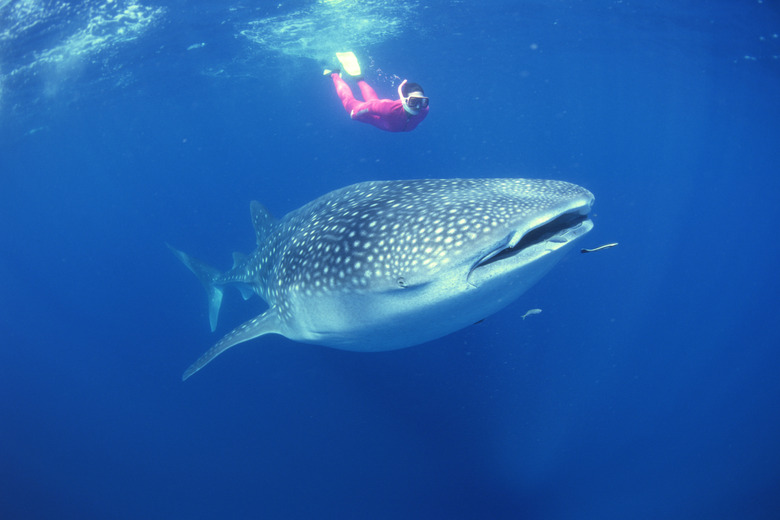Why Are Whale Sharks Important To Our Ecosystem?
The whale shark is the largest fish in the world and can be more than 40 feet long. They are found in warm seas throughout the world. They are a docile species that feeds on plankton and other tiny sea creatures. Scientists aren't exactly certain what would happen if they became extinct.
Description
Description
Whale sharks have streamlined bodies, flattened heads, large gills and a wide mouth near the front of the snout. Their skin ranges between gray and brown and features white spots and pale stripes in checkerboard-like pattern. Their stomachs are white. Their two dorsal fins are located near the rear of a long body that ends in caudal fin or tail divided into two lobes.
Distribution and Habitat
Distribution and Habitat
Whale sharks prefer warm water between 68.9 degrees and 86 degrees Fahrenheit. They are found in most of the world's tropical and warm temperate seas except the Mediterranean. They're found in the Pacific Ocean from Chile to California, from Japan to Australia and off the coast of Hawaii. In the Atlantic, they are found from New York to Brazil and from the Gulf of Guinea to Senegal, Africa. In the Indian Ocean region, they are found from the Red Sea to the Arabian Gulf.
Feeding
Feeding
Although they are the largest fish in the world, whale sharks feed on tiny animals and plants including plankton, small crustaceans, tuna and squids. A whale shark filter feeds by opening its mouth, pushing out its jaws and sucking in water. The whale shark then closes it mouth and lets the water pass through the gills. In between opening its mouth and opening its gills, tiny animals are trapped by the sieve-like structure formed by the tooth-like scales in the mouth called denticles.
Food Web
Food Web
Sharks are top level predators, or predators who don't have any other predators of their own. Scientists have observed that when top level predators are lost from an ecosystem, the population of that predator's prey animals rapidly swells. The population sometimes gets so big that the prey animals soon eat up their food supply. It is very difficult to conduct research on the shark's role in the ecosystem so scientists aren't sure what would happen if sharks became extinct. However, scientists theorize that if the great white became extinct there might be an increase of seals, sea lions and small whales. If the whale shark becomes extinct, there might be an increase in plankton. However, plankton are also eaten by several species of whale.
References
- "The Role of Sharks in the Ecosystem"; Marine Education Society of Australia; 2005
- Nat Geo Wild: Whale Sharks
- Florida Museum of Natural History; Whale Shark; Carol Martins and Craig Knickle
Cite This Article
MLA
III, Frank B. Chavez. "Why Are Whale Sharks Important To Our Ecosystem?" sciencing.com, https://www.sciencing.com/whale-sharks-important-ecosystem-10065229/. 24 April 2017.
APA
III, Frank B. Chavez. (2017, April 24). Why Are Whale Sharks Important To Our Ecosystem?. sciencing.com. Retrieved from https://www.sciencing.com/whale-sharks-important-ecosystem-10065229/
Chicago
III, Frank B. Chavez. Why Are Whale Sharks Important To Our Ecosystem? last modified March 24, 2022. https://www.sciencing.com/whale-sharks-important-ecosystem-10065229/
